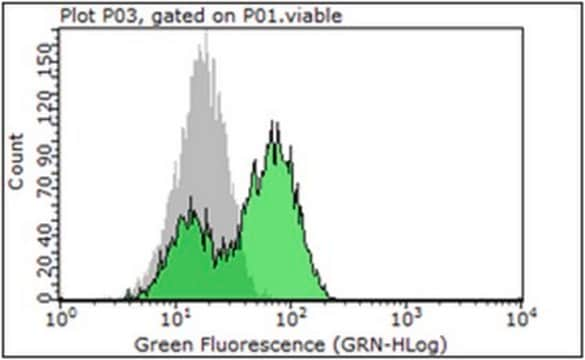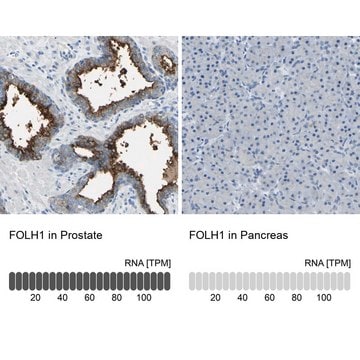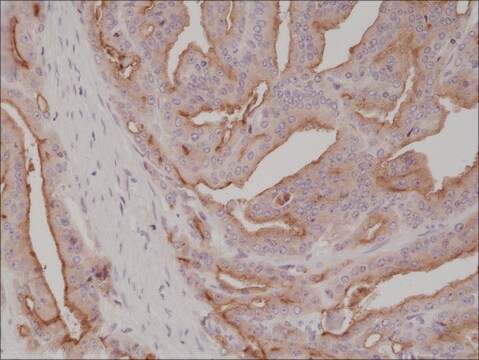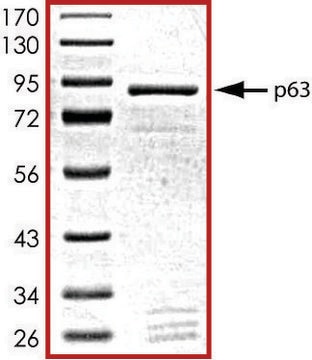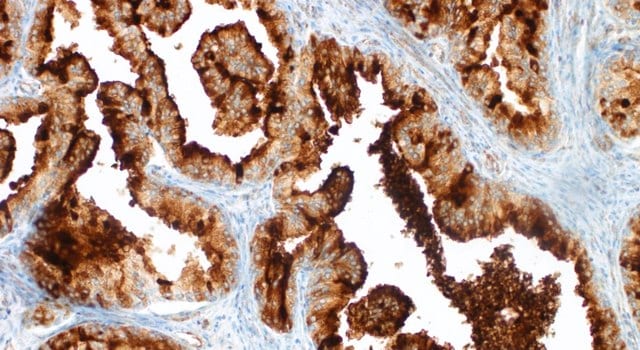327R-1
PSMA (EP192) Rabbit Monoclonal Primary Antibody
Sinonimo/i:
Prostate-specific membrane antigen
About This Item
Prodotti consigliati
Origine biologica
rabbit
Livello qualitativo
100
500
Coniugato
unconjugated
Forma dell’anticorpo
culture supernatant
Tipo di anticorpo
primary antibodies
Clone
EP192, monoclonal
Descrizione
For In Vitro Diagnostic Use in Select Regions
Forma fisica
buffered aqueous solution
Reattività contro le specie
human
Confezionamento
vial of 0.1 mL concentrate (327R-14)
vial of 0.1 mL concentrate Research Use Only (327R-14-RUO)
vial of 0.5 mL concentrate (327R-15)
vial of 1.0 mL concentrate (327R-16)
vial of 1.0 mL concentrate Research Use Only (327R-16-RUO)
vial of 1.0 mL pre-dilute Research Use Only (327R-17-RUO)
vial of 1.0 mL pre-dilute ready-to-use (327R-17)
vial of 7.0 mL pre-dilute ready-to-use (327R-18)
vial of 7.0 mL pre-dilute ready-to-use Research Use Only (327R-18-RUO)
Produttore/marchio commerciale
Cell Marque™
tecniche
immunohistochemistry (formalin-fixed, paraffin-embedded sections): 1:10-1:40 (concentrated)
Isotipo
IgG
Controllo
prostate
Condizioni di spedizione
wet ice
Temperatura di conservazione
2-8°C
Visualizzazione
cytoplasmic, membranous
Informazioni sul gene
human ... FOLH1(2346)
Categorie correlate
Descrizione generale
Qualità
 IVD |  IVD |  IVD |  RUO |
Stato fisico
Nota sulla preparazione
Note: This requires a keycode which can be found on your packaging or product label.
Download the latest released IFU
Note: This IFU may not apply to your specific product lot.
Altre note
Note legali
Not finding the right product?
Try our Motore di ricerca dei prodotti.
Codice della classe di stoccaggio
12 - Non Combustible Liquids
Classe di pericolosità dell'acqua (WGK)
WGK 2
Certificati d'analisi (COA)
Cerca il Certificati d'analisi (COA) digitando il numero di lotto/batch corrispondente. I numeri di lotto o di batch sono stampati sull'etichetta dei prodotti dopo la parola ‘Lotto’ o ‘Batch’.
Possiedi già questo prodotto?
I documenti relativi ai prodotti acquistati recentemente sono disponibili nell’Archivio dei documenti.
Il team dei nostri ricercatori vanta grande esperienza in tutte le aree della ricerca quali Life Science, scienza dei materiali, sintesi chimica, cromatografia, discipline analitiche, ecc..
Contatta l'Assistenza Tecnica.